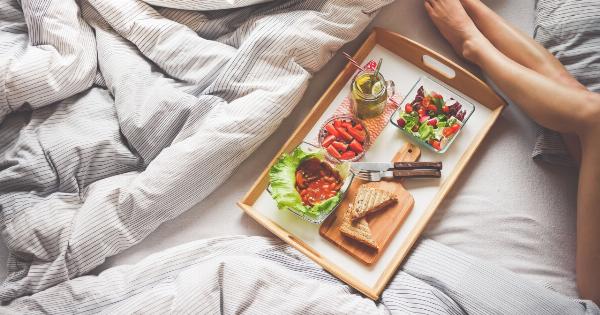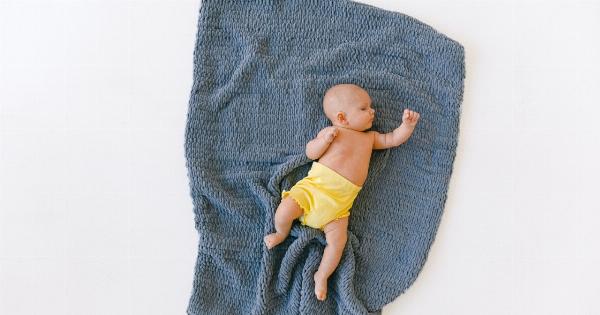Getting a good night’s sleep is essential for our overall health and well-being.
It not only helps us feel refreshed and energized the next day, but it also plays a crucial role in maintaining a healthy weight, regulating hormones, and improving cognitive function. Many factors contribute to a good night’s sleep, including our diet. The food we consume before bedtime can have a significant impact on the quality of our sleep.
In this article, we will explore the do’s and don’ts of eating for a good night’s sleep.
1. Do Follow a Regular Eating Schedule
Establishing a regular eating schedule can help regulate your body’s internal clock, also known as the circadian rhythm.
Aim to have your meals at consistent times each day, as this can train your body to know when it’s time to sleep, wake up, and digest food efficiently. Going to bed with a full stomach or an empty one can both be disruptive to your sleep, so finding a balance that works for you is essential.
2. Don’t Consume Large Meals Before Bed
While it’s important not to go to bed hungry, consuming large meals right before bedtime can lead to discomfort and indigestion, making it challenging to fall asleep.
Digesting a heavy meal requires a lot of energy from your body, which can interfere with your sleep. It is recommended to finish your dinner at least two to three hours before bedtime to allow for proper digestion.
3. Do Include Sleep-Friendly Foods in Your Diet
Certain foods contain essential nutrients and compounds that promote better sleep. Incorporating these sleep-friendly foods into your diet may help improve the quality of your sleep.
Foods like kiwis, almonds, fatty fish, bananas, tart cherries, and whole grains are rich in nutrients like magnesium, potassium, melatonin, and tryptophan, which can aid in relaxation and better sleep.
4. Don’t Consume Stimulants Before Bed
It’s no surprise that consuming stimulants like caffeine or nicotine before bed can interfere with your sleep. Caffeine is a well-known stimulant that stays in your system for hours and can disrupt your ability to fall asleep.
It is advised to avoid consuming coffee, tea, or caffeinated beverages at least six hours before bedtime. Nicotine, commonly found in cigarettes and some e-cigarettes, is another stimulant that can interfere with your sleep quality.
5. Do Limit Fluid Intake Before Bed
While staying hydrated throughout the day is essential, consuming excessive fluids before bed can lead to disruptive middle-of-the-night trips to the bathroom. To avoid this, try to limit your fluid intake a few hours before bedtime.
However, do not ignore your body’s thirst cues; if you feel thirsty, take small sips of water to stay hydrated without overloading your bladder.
6. Don’t Rely on Alcohol to Induce Sleep
Many people turn to alcohol as a sleep aid, thinking that it helps them fall asleep faster. While alcohol may initially make you feel drowsy, it can disrupt your sleep architecture and impair the quality of your rest.
It can interfere with the REM (rapid eye movement) stage of sleep, leading to fragmented and non-restorative sleep. It’s best to avoid relying on alcohol as a sleep aid and instead focus on establishing healthy sleep habits.
7. Do Opt for Light Snacks if Needed
If you find yourself hungry before bed, it’s okay to have a light, sleep-friendly snack. Opt for snacks that are low in sugar, fat, and caffeine.
Some examples include a small piece of fruit, a handful of nuts, a cup of herbal tea, or a plain yogurt. These snacks can help satisfy your hunger without causing discomfort or interfering with your sleep.
8. Don’t Consume Spicy or Acidic Foods
Eating spicy or acidic foods before bed can cause heartburn, indigestion, and acid reflux, making it difficult to sleep comfortably.
If you are prone to experiencing these symptoms, it is best to avoid foods like citrus fruits, tomatoes, spicy curries, and acidic sauces before bedtime. Opt for milder and easily digestible options instead.
9. Do Practice Mindful Eating
Mindful eating involves paying attention to your body’s hunger and fullness cues, as well as the sensory experience of eating. When you eat mindfully, you are present in the moment, savoring each bite and eating at a slower pace.
This practice can help prevent overeating, promote better digestion, and improve your overall relationship with food, leading to better sleep quality.
10. Don’t Overindulge in Sugary Desserts
Sugary desserts not only provide little nutritional value but can also lead to an energy crash and disrupt your sleep. Consuming high amounts of sugar before bed can cause fluctuations in blood sugar levels, leading to restless sleep.
If you crave something sweet, opt for healthier alternatives like a small piece of dark chocolate or a naturally sweetened fruit option.
Conclusion
Incorporating healthy eating habits into your daily routine can positively impact the quality of your sleep.
By following a regular eating schedule, avoiding large meals before bed, including sleep-friendly foods in your diet, and being mindful of your consumption of stimulants and fluids, you can optimize your sleep patterns and wake up feeling refreshed. Remember, a good night’s sleep starts with the choices you make during the day and before bedtime.
























